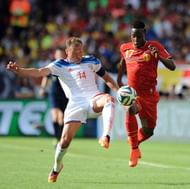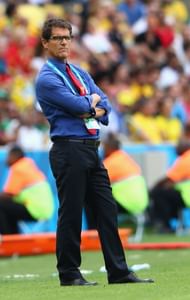Belgium left it late to beat Russia, as an 88thminute winner from substituteDivock Origi earned the tournament dark-horses a place in the Round of 16.A drab match picked up pace in the last 15 minutes, with Kevin Mirallas hitting the post with a free-kick, while theRussians went close on the counter-attack.With the win, Belgium as good as confirmed their spot as Group H winners, while Fabio Capellos Russia will now have to win their final match against Algeria, and hope other results go in their favour.
#1 Draws are underrated
An enthralling World Cup has thrown up goals by the bucketful for the audience. Despite the high temperatures and humidity, teams have thrown themselves forward in the search for goals. In such a scenario, it is easy to curse countries of the less adventorous variety.
But consider Russia’s fate. With two minutes of normal time left to play, Fabio Capello’s men could have thought they had done enough to secure a point and a position in the knockout stages. With South Korea set to face Belgium in the final game, a victory for Russia against Algeria could very well put them in second place. However, in seacrh of a win, they tried to match the Belgians and went for a goal.
A loss means the Russians can only pray and hope.

Consider the last team that had to depend on other teams to stand a chance of qualifying: England.
The English needed Italy to beat Costa Rica after their disastrous showing. But the central Americans had other ideas, and shocked their opponents.
England’s matches, as well as Russia’s against Belgium, are the perfect examples of when to play for a draw. The English chose to attack in their attempts to win against Italy and Uruguay, and were beaten 2-1 on both occasions after being level.
There is no shame in shutting shop if you are not good enough. At least you can get to the next round.
#2 The subs are all right
For the second game runnng, Belgium emerged winners because of a substitute. In fact, all three of their goals in the tournament have been scored by substitutes.

Coach Marc Wilmots may be delighted by the win, but he’ll need to take a hard look at his misfiring team. Belgium should not be scraping through by a one-goal margin against teams like Russia and Algeria. But Wilmots could argue that at least his team are winning, whereas others, such as Spain and England, are catching the early flight home.
A world cup in Brazil was always going to be about preserving energy, and it almost seems appropriate that it’s the substitutes who are scoring the winners for Belgium. European teams are supposed to struggle in the heat and humidity, and Belgium are proving it, having to call upon members from the bench to do the job.
A tournament is also supposed to be about squad strength, and if there is one thing Spain and England didn’t have, it was depth and strength in their entire squad.
#3 A case of missing attackers
Belgium lost striker Christian Benteke to injury even before the World Cup started. His replacement, or rival for the starting spot, Romelu Lukaku has misfired magnificently in both the games, even though he struck a hat-trick in a friendly against Luxembourg prior to the tournament.
Belgium can consider themselves lucky that Dries Mertens and Divock Origi stepped up to the plate and won them the games against Algeria and Russia.

Russia, on the other hand, can only wonder what is going wrong. Fabio Capello left out striker Pavel Pogrebnyak from the squad. To further confound the goal-scoring problem, the Italian has not been starting Alan Dazogoev, with the attacking midfielder having played a grand total of 38 minutes of normal time in the first two matches. The 24-year-old CSKA Moscow midfielder had finished as the joint top-scorer in Euro 2012.
In football, goals win you games, and although Wilmots has persevered with Lukaku, his substitutes have done the job for him. Capello chose to leave out one frontman, and has refused to start probably his best player, Dzagoev. Little wonder that Group H is miserly in front of goal.
#4 Hazard leaves it late to turn up the heat
Few players came into the tournament in better form than Eden Hazard. He was voted as Chelsea’s player of the season, came second to Luis Suarez at the PFA Player of the Year awards, and was the PFA Young Player of the Year in 2013-14. To further aid his talents, Belgium’s two holding midfielders give Hazard plenty of freedom to roam around without having to worry about defensive duties, and instead focus on being in the opposition’s half, frightening them with pace and movement not seen everyday.
But his 17-goal season at Chelsea also saw him drifting in and out of games, not influencing the run of play as a player of his ability should. Anf given his unflattering past record for the national team – a meagre return of five goals and 10 assists in 43 games – not many would have chosen Hazard in their fantasy football teams.

However, the winger decided to finaly turn up against Russia, burning the grass on the Russian right flank with serious pace late in the game, skipping past a couple of defenders and setting up Origi for the game’s solitary goal. Belgium could have had another in added time, but for Kevin Mirallas’ weak effort after a quick counter thanks to Hazard.
Belgium may have qualified for the Roun d of 16, but they need Hazard to wake up early during games if they have to go further.
#5 What next for Capello?
For the second consecutive World Cup, Fabio Capello has presided over a team that has played some of the most uninspiring football played. In 2010, England had scraped through the group stage following mind-numbing draws against the USA and Algeria, with only a narrow 1-0 victory over Slovenia seeing them through.
His time with Russia has not been too different. While a poll prior to the world cup showed that 18% of Russians expected to win the world ctitle, with only 7% seeing Russia failing to get past the group stage, the numbers may have changed rather drastically now.
The Italian signed a mega contract in January, extending his deal to 2018, when Russia host the World Cup themself. He may have had a stellar career as the manager of some of the biggest clubs in the world. International management, however, is clearly not suited to Capello’s style of grinding out results, although it would have helped him if his side did get some positive results.

